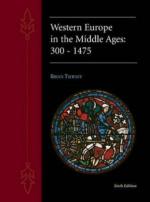|
This section contains 346 words (approx. 2 pages at 300 words per page) |

|
In time, the power and authority of the mayors surpassed those of the Merovingian kings themselves. Eventually, in 687, the most powerful of the mayors, Pepin of Heristal (687–714), took control of the kingdom. By warfare or political intrigue, he succeeded in eliminating the other mayors as potential rivals. Pepin's grandson, Pepin the Short (741–768), was responsible for securing the royal crown for himself and his descendants. In 751, with the blessings of the pope, Zacharias, Pepin the Short removed the last of the Merovingian kings from the throne and was himself declared king of the Franks. His family, the Carolingians, became the new ruling dynasty and would sit on the throne of Frankia until the last quarter of the tenth century.
But it was Pepin's son and successor, Charlemagne (768–814), who would prove the most outstanding of the Carolingians. One of the greatest rulers of medieval Europe, Charlemagne was a...
|
This section contains 346 words (approx. 2 pages at 300 words per page) |

|




